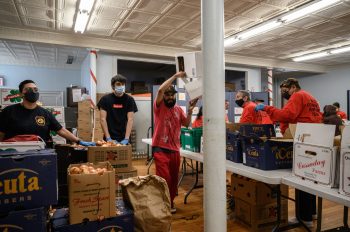Drought hits bread basket’s food banks
Kai Ryssdal: I was in Indiana for a couple of days the end of last week. Did a lot of driving, saw a whole lot of corn fields. Thing was, a lot of ’em were so dried out and stunted they could have been wheat fields. Not green and tall the way you’d expect this time of year.
The drought that’s hit a huge chunk of the country is doing a number on crops. And consumers are or will see rising prices at the supermarket. What’s not so easy to see is what it’s doing to food banks. From San Antonio, Texas Public Radio’s David Martin Davies has the story.
David Martin Davies: It looks and sounds like a busy loading dock at the San Antonio Food Bank. Forklifts unload trucks and move pallets piled high with processed food. Summer is actually the busiest time for food banks as they deal with kids missing school lunches.
But poke your head in the large walk-in refrigerator and you’ll notice there’s a shrinking supply of fresh greens and vegetables. There are a few cases of bruised green zucchinis, cucumbers and lettuce – but the cold unit is mostly empty and you can blame that on the drought.
Michael Guerra: The drought is turning into a bit of a perfect storm in a bad way for us.
Michael Guerra is the chief development officer for the San Antonio Food Bank.
Guerra: What we are seeing is many farmers struggling. Less water means less produce. Less produce for them means less produce to go into the donated food pipeline.
Last summer — during the heart of the drought in Texas — produce donations were down 20 percent. And $170,000 was spent trucking in the fresh veggies. Expect a repeat this summer. If not, folks go home with just rice, beans, and peanut butter.
Guerra: Good stuff, we know that. But the health implication of not having more produce, fruits, and vegetables in their diet is pretty severe.
And finding local farmers still growing produce is turning into a tough job.
Francis “Country” Moczygemba: My name is Francis “Country” Moczygemba, and I’m the shed manager for the fresh produce program.
Country earned his nickname honestly. He has bushy gray mustache, a big cowboy hat, and hands calloused and nicked up from a lifetime of working the land. He’ll tell you that farming is getting tougher because of the drought, which is in its fifth year in Texas. Country deals directly with the South Texas farmers and he says they are saving their dwindling water for higher dollar crops like cotton, not so much for vegetables.
Moczygemba: Are numbers are starting to diminish on the donated side We’re looking at sourcing from as far away as Arizona and California but our transportation cost are extremely prohibitive, makes our produce extremely expensive.
Up in the Corn Belt, the drought brings more bad news.
Brian Barks: The corn and the beans simply can not take the non-stop oppressive heat.
Brian Barks of the Food Bank of the Heartland in Omaha, Neb., says it’s a drought double whammy. Higher food prices squeeze private donations. And another food source is cutting back — Uncle Sam.
Barks: At our food bank, approximately 25 percent of our inventory comes from United States Department of Agriculture commodities program, and we have seen a significant reduction.
Barks says USDA surplus commodities — staples like peanut butter and corn — will be cut back further as the prices rise. But now with the food bank shelves bare there’s another problem: The drought is an economic downer for America’s breadbasket, driving up demand for food bank services.
Ross Fraser of Feeding America, the nation’s leading hunger relief charity, says the problems are only going to get worse.
Ross Fraser: We’re more concerned for what this means down the road. We know that corn crops, wheat crops, other crops that livestock feed on are way down so we’re worried about dairy prices going up, meat prices going up.
That will mean less supply and more demand for local food banks — run on shoe string budgets, staffed by volunteers, stocked by donations and already stretched to the limit.
In San Antonio, I’m David Martin Davies for Marketplace.
There’s a lot happening in the world. Through it all, Marketplace is here for you.
You rely on Marketplace to break down the world’s events and tell you how it affects you in a fact-based, approachable way. We rely on your financial support to keep making that possible.
Your donation today powers the independent journalism that you rely on. For just $5/month, you can help sustain Marketplace so we can keep reporting on the things that matter to you.


















